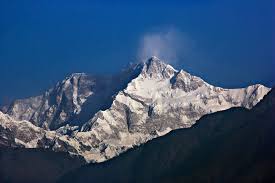Mt. Khangchendzonga:

Sikkim Chief Minister recently urged the Centre to ensure that Mt. Khangchendzonga, the world’s third-highest peak, regarded as sacred by the people of the State, is made out of bounds for mountaineers.
- Khangchendzonga (also known as Kanchenjunga) is the highest peak in India and the third-highest peak in the world after Mount Everest (Chomolongma) in Nepal and K2 in Pakistan.
- It is situated in the eastern Himalayas on the border between Sikkim state, northeastern India, and eastern Nepal, 74 km north-northwest of Darjeeling, Sikkim.
- It has an elevation of 28,169 feet (8,586 metres).
- It is part of the Great Himalaya Range.
- The name Khangchendzonga has been variously translated as “Five Treasuries (or Strongboxes) of the Great Snow” or “Great Five-Peaked Fortress of Snow.”, a reference to its five separate summits.
- Kanchenjunga has four ridges extending north, east, south, and west. Between them are four glaciers: the Zemu (northeast), the Talung (southeast), the Yalung (southwest), and the Kanchenjunga (northwest).
- The mountain and its glaciers receive heavy snow during the summer monsoon season and a lighter snowfall during the winter.
- To the east, Khangchendzonga National Park in Sikkim is a mountain wilderness with a wide variety of animal species.
- Charles Evans in 1955 led a British expedition up the southwest face in the first successful ascent of Kanchenjunga.




